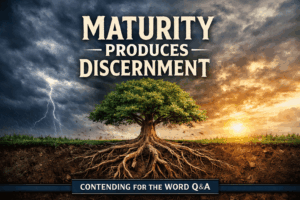⏱️ Estimated Reading Time: 5 min read
Christian ethics is that realm of Christian theology that concerns itself with taking the truth of Scripture and applying it to the Christian life. The sufficiency of Scripture concerns itself with the faith and practice of Christians and how they utilize the Scripture in every phase and stage of life. Christian ethics and the sufficiency of Scripture are not divorced from each other but united at the hip; how we do Christian ethics matters because it is fueled by our understanding of the sufficiency of Scripture.
Christian Ethics, Mental Health, and the Abortion Discussion
A lady goes up to her Pastor and asks him about abortion, and the Pastor lets her know that having an abortion is murder. That is a good answer, and the Pastor explains what Scripture teaches and then talks about life in the womb—another good answer. But an even better answer would be to also emphasize the importance of the mother’s life and the baby’s life. We need to focus on the baby and the mother in contemporary Christian ethics. Both are equally made in the image and likeness of God. Both need the rescue God provides through the person and work of Jesus.
We could similarly consider how we treat the elderly. It isn’t only that we ought to treat the elderly with honor and respect, but we also focus on how their care is received and given. It is good that today there is a great emphasis on mental health and the elder care, but as a society we fail in providing sufficient care for our veterans.
Since 2012, I’ve had a close and personal view of how veterans are treated in this country. My father is a Retired LT. Colonel in the United States Army. While he is treated well and has decent care, I’ve also witnessed failures in the system. Now that restrictions have been lifted, my dad has been able to see his doctors in person. However, in the 18 months prior to everything reopening, he hadn’t been able to see his VA psychologist in person because they weren’t allowing it due to COVID-19 lockdowns and regulations.
I am not getting into the whole COVID-19 situation in this article. I am merely using this as one example to illustrate that, in our approach to Christian ethics, we must view the whole person as made in the image and likeness of God, and in need of the rescue that only God can provide through the person and work of Christ.
The Danger of a Cookie-Cutter Approach to Christian Ethics
The Church needs to avoid taking—what I call—a cookie-cutter approach to these types of situations. In Christian ethics, a cookie-cutter approach to discipleship reveals our view of the sufficiency of Scripture, which is low, at best, and is being undermined in our approach to Christian ethics, at worst. When we view the elderly as a problem to be fixed (or in some instances, avoided completely), we undermine the intent of the Titus 2 ministry, where older men instruct young men and older women instruct younger women. In other words, we dismantle the very nature of intergenerational discipleship, which results in undercutting the transfer of the gospel from one generation to another.
Our approach to Christian ethics and the hard questions we face in the coming days, ranging from issues related to abortion to the care of the elderly, must be informed by Scripture. When our understanding of Christian ethics is shaped by Scripture, it must, by extension, be shaped by a view toward the whole person and not just one aspect of life. Jesus made it clear in the Great Commandment that we are to love the Lord with all we are and our neighbors as ourselves (Matthew 22:37-40). That means we are to love Him, and such a love fuels a love for others.
The sufficiency of Scripture is vital to understand. The Scriptures are sufficient for the faith and practice of God’s people in every aspect and phase of life. At the street level, you can say that the sufficiency of Scripture is enough for you—period; and it answers your questions. To put it another way, Scripture helps us know not only why and how to answer questions, but also how those answers affect our own lives and the lives of others.
The Work and Concern of Christian Ethics
Christian ethics is concerned with taking the Word and the best of the theological disciplines and applying those answers to the lives of real people. The sufficiency of Scripture intersects with this concern for every phase and aspect of life. Therefore, we can say that our understanding of Christian ethics and our view of the sufficiency of Scripture matters because they both are fueled by and concerned with the Imago Deo and God’s grace.
Christians can be confident in satisfactory answers from Scripture, whether on issues related to the care of the elderly or, even more challenging, the issue of abortion. We should not be afraid to enter the public square, proclaim what Scripture says, and engage what others are saying in the public square—whether they are Christians or not.
No one is neutral. Everyone is a theologian. As R.C. Sproul once remarked, the issue is whether we are good or bad theologians. So, everyone from atheists to Muslims and everywhere in-between is doing theology. As Christians, we have an objective revelation in God’s Word that addresses the whole person—from sin to salvation—to the end of our lives and into eternity. God has not left us without answers to engage the issues of society. So, as we engage in the public square, may you and I, as Christians, faithfully and fearlessly proclaim the truth from Scripture, and trust the Holy Spirit to open eyes and ears to the truth of Scripture.
Dave Jenkins is happily married to his wife, Sarah, and lives in beautiful Southern Oregon. He is a writer, editor, and speaker who loves Christ, His people, the Church, and sound theology.
Dave serves as the Executive Director of Servants of Grace Ministries and the Executive Editor of Theology for Life Magazine. He is the Host and Producer of the Equipping You in Grace Podcast and a contributor to and producer of Contending for the Word.
He is the author of The Word Explored: The Problem of Biblical Illiteracy and What To Do About It (House to House, 2021), The Word Matters: Defending Biblical Authority Against the Spirit of the Age (G3 Press, 2022), and Contentment: The Journey of a Lifetime (Theology for Life, 2024).
You can connect with Dave on Facebook, X (Twitter), Instagram, YouTube, or subscribe to his newsletter.
When he is not engaged in ministry work, Dave enjoys spending time with his wife, going to movies, sharing a meal at a favorite restaurant, or playing a round of golf with friends. He is also a voracious reader, particularly of Reformed theology and the Puritans, and is often found working through a stack of new books from a wide range of Christian publishers.
Dave earned his M.A.R. and M.Div. from Liberty Baptist Theological Seminary.




